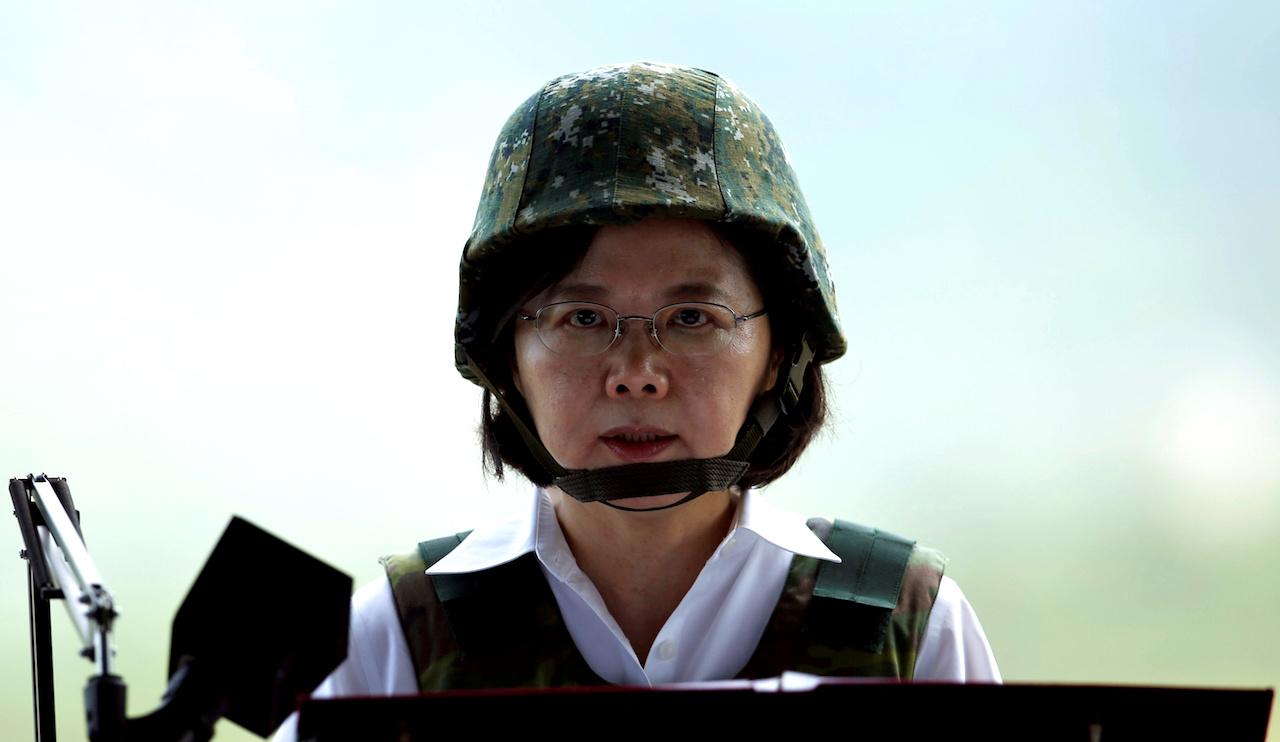After Trump’s call, China urges US to bar Taiwan’s leader
Taiwanese President Tsai Ing-wen takes part in an annual Han Kuang military drill simulating the China's People's Liberation Army (PLA) invading the island, in Pingtung county, southern Taiwan, Aug. 25, 2016.
China has urged Washington to block Taiwan's president from passing through the US, after reports said she may stop in New York for talks with Donald Trump's team, following a protocol-smashing phone call between the pair.
The president-elect broke with decades of precedent last week to accept a congratulatory phone call from Tsai, angering Beijing, which regards the island as a rogue province awaiting unification.
Taiwan's Liberty Times reported that President Tsai Ing-wen may seek to meet members of Trump's team while in New York on her way to Central America, though her office would not confirm the plan to AFP.
The trip would take place before Trump’s inauguration on Jan. 20, the newspaper said.
Taiwan has diplomatic relations with 22 states, and the island's leaders make regular visits to its small group of allies in Central America and the Caribbean, often stopping in the US for meetings with sympathetic lawmakers.
China's foreign ministry called on Washington to block any stopover in the United States.
Tsai's "true intention is self-evident", it told AFP on Wednesday. "We hope America abides by the principle of the One China policy and the three US-PRC Joint Communiques and does not allow her transit."
Countries that have formal diplomatic ties with Beijing cannot enjoy such links with Taipei and vice versa. Both Beijing and Taipei in principle consider themselves the only legitimate power in charge of both China and Taiwan.
Beijing further warned against Washington giving an "erroneous signal to 'Taiwanese independence' forces".
Trump's surprise call with Tsai and subsequent Twitter barrage criticising Chinese military expansions and accusing it of manipulating its exchange rate seemed to have caught Beijing off-guard.
'Diplomatic rookie'
China's foreign ministry repeatedly deflected or downplayed reporters' questions Monday. But by Tuesday, state media were trotting out attacks on Trump as a "diplomatic rookie".
On Wednesday they emphasised the need for calm, with experts in the often shrill Global Times urging China to "watch and wait" until Trump takes office and not to "play his games".
Reports suggest the call was long-planned by both sides, but whether Trump wants a wholesale change in US policy on Taiwan is still unclear.
Communist Party authorities will be closely watching Trump's picks for secretary of state and ambassador to China as a sign of whether he truly intends to take a hard line on the world's second-largest economy.
Although the United States is Taiwan's main ally and arms supplier, it has not had official diplomatic relations with Taiwan since 1979, when it switched recognition from Taipei to Beijing.
Asked about Tsai's visit, a US State Department spokesman said at a briefing on Monday that such transits were in keeping with "longstanding US practice" and noted the US "usually" allows Taiwan's leaders to pass through the country.
It would be the second such trip for Tsai, who stopped over in Miami and Los Angeles on her way to Panama and Paraguay earlier this year during her first overseas trip as president.
Beijing protested to Washington over that trip as Tsai met with US politicians in Miami.
Previous presidents of Taiwan have also transited the US, with Tsai's predecessor Ma Ying-jeou stopping in Hawaii in 2014 and Boston in 2015.
Taiwan has haemorrhaged allies in recent decades as they jumped ship to align with an ascendant China.
We want to hear your feedback so we can keep improving our website, theworld.org. Please fill out this quick survey and let us know your thoughts (your answers will be anonymous). Thanks for your time!
